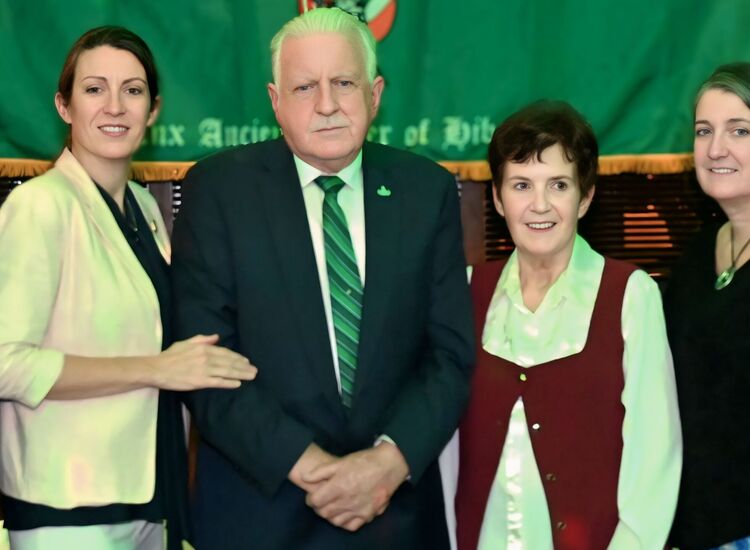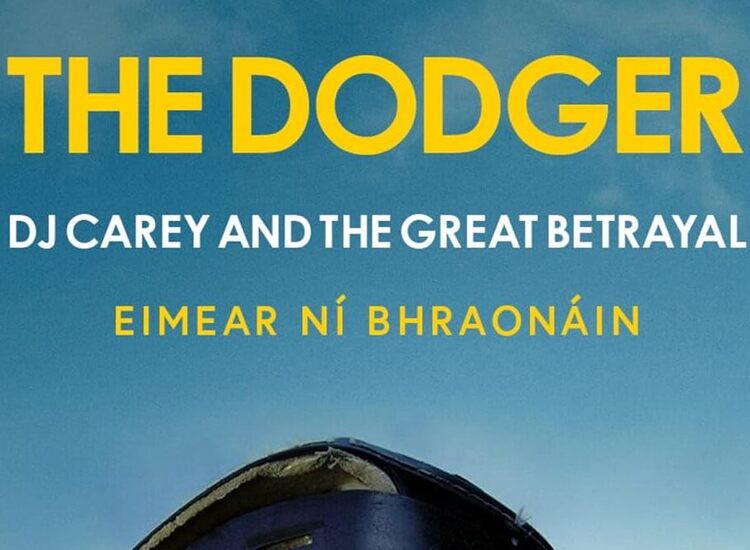The Christmas of the past can seem better than the Christmas of the present.
Why is that? One answer is: We had less, but what we did have was more important.
But regardless of what we did or didn’t have, much of what was important to us looms large in the memory – parents, grandparents and others who are gone; feelings of wonder and excitement about the season and about Santa.
We asked some regulars at the New York Irish Center’s Seniors Lunch who were children in Ireland to look back at that time in their lives.
FEELING SPECIAL
“Little things were big in our hearts,” remembered Kathleen Doherty about growing up in Mallow, Co. Cork. In that category can be included the image of Santa in the top-left corner of the front page of the newspaper.
“We didn’t have all the decorations that people have today,” she said. “But every Christmas was just wonderful. It’s just great memories.”
Doherty arrived in New York on Dec. 23, 1964. Her first job was in a big house in Connecticut minding champion Schnauzer dogs. “It was actually a castle,” she said. As a 16-year-old she had a good enough time, as there were six to eight other employees from Europe there. “It was different,” she said.
After a couple of years, she moved to New York, and Christmas became a family time again. And now that she was older, a friends’ time as well. A local priest would organize a Wren Boys’ outing on St. Stephen’s Day. They went from bar to bar on Kingsbridge Road, she can remember.
The early Christmases in New York bring to mind fond feelings of two older brothers, both of whom were to die in their 50s – one of them a Vietnam veteran, from the effects of Agent Orange.
She was from the “second batch.” Her mother had married again back home in Ireland having been widowed when expecting her fifth child in the U.S.
Kathleen Doherty.
Her mother’s American experience meant she knew how to stretch things out and she also knew how to make her children feel special.
“Santa came – we had to share,” she recalled. There were also occasional trips to Woolworth’s in Cork City to buy small toys.
A big highlight, looking back more than 60 years, was “the church and the singing.”
“Silent Night” was and is a favorite. “That stands out, the choir was just brilliant.”
Doherty’s father had an old Ford that had to be started with a crank. Most people still relied on more basic means of transportation, like the woman that her family allowed to park a pony and trap beside their home while she attended Mass. By way of thanks, she gave them a goose at Christmas.
“I can still smell the stuffing,” she said,
Doherty worked for a long time in home care and retired four years ago. Her husband, who is from County Armagh and like her late brother a Vietnam veteran, was a building manager for 37 years.
She’s grateful that her daughter, like her mother long ago, makes the best of simple things and isn’t into “grandeur.”
“Maybe people were poor,” she said of her childhood in Ireland. “But thinking back we had everything – love, respect and we had warmth.
“We had what the world needs now,” Kathleen Doherty said.
MISSING HOME
Belturbet, Co. Cavan native John McGurrin arrived in New York on Feb. 26, 1955, via a boat that had come from Cobh.
“In my memory, it was a Saturday,” he said, accurately naming the day. “I was 12 years old, and my aunt had me registered in school for Monday in St. Teresa’s of Woodside.”
He’d been accompanied on the ocean voyage by his parents and two sisters. His mother died of cancer four months after they arrived. So memories of a time before that are particularly special.
On Christmas Day back home, the family would walk the two and a half miles to and from the church.
They raised turkeys and so kept one or two for their own Christmas. The main meal was served at about 2:30 p.m.
“An apple may be much to get for Christmas but it was something,” McGurrin said, adding that these days kids will “ditch” a present after a few days.
John McGurrin.
He noticed a “big difference” with what children got in New York at Christmastime.
“Even back then in 1955, these kids would get three and four presents,” he recalled. “We were still pretty poor.”
Did he miss Ireland? “I certainly did,” McGurrin replied.
New York’s summer heat was uncomfortable and it almost drove the family back to Cavan. Also, other students would pick on him because of his accent. “But I made friends with a big guy,” he said about the solution to that problem.
In 1967, McGurrin was drafted into the U.S. military; however, after basic training he received a hardship discharge to help care for his younger sister who was suffering from MS. “It was just my father,” he said.
McGurrin’s older sister had married an Irishman and returned home with him. Eventually his father would join them.
He got a college education in New York, which is something that he reckons he may not have a chance to get back home. After Iona College and Fordham, he qualified as a social worker.
McGurrin, who is single, left Woodside in 1984 when he bought a co-op in Jackson Heights.
“I’ve had a full life,” he said. “I went all over the world.”
During his 35 years as a social worker, he made full use of his five weeks’ vacation. He once even caught a piranha from the Amazon River.
He still remembers and appreciates the “firmness and love and respect that I grew up with and that’s I want to leave with.”
John McGurrin said, “We had enough to eat and we had a nice family. Everybody was close.”
ALL ABOUT THE BAKING
Bridget Burke arrived in New York in the summer of 1972, not long after she sat for her Leaving Certificate. She was the youngest of 11 children born to a farming family in Connemara, Co. Galway.
Her sister, who was 17 years older, had asked for her help as she was expecting her fifth child.
She had to adapt. She spoke sometimes in their native Irish with her sister, but her brother-in-law had left Kerry when he was three and knew none.
Christmas in New York was “money, money, money,” she remembered.
Back home in Connemara, it was less about gift-giving and more about baking.
“They were lovely kids,” she said of her sister’s children. “But they almost forgot their presents the next day. That was New York for you.
“Now it’s too commercialized both at home in Ireland and New York,” Burke said.
Typically, her presents might be a coloring book, some crayons, an apple and an orange, and a packet of sweets. The last she had to share with her older siblings. “It broke my heart,” she recalled with a laugh about the sweets.
Balloons added to the fun.
“We looked forward to the baking as far back as I remember,” she said. Traditional Christmas fruitcake with icing, plum pudding, Dundee cake and so on. Christmas cake was the favorite. The family weren’t so into the plum pudding, but her mother made it so she could talk about it with the neighbors. It was tradition. Everything about the baking was fun, the whole ritual of it and the placing of a figurine, for example.
“We’d run to the mailman for that Christmas card,” she said, and it might have $5.
Burke had brothers in England, and sometimes they’d make it home. But one was training to be a nurse in Surrey and so it wasn’t always possible for him.
They went to Mass on Christmas Eve about 6 p.m. and then again on Christmas morning.
The goose was for Christmas Day and the duck for New Year’s Day, but turkey sometimes figured also.
And it was ham with duck again on Little Christmas, Jan. 5.
She believes her parents liked Christmas more as time went on.
“They enjoyed me, and the next brother to me. There was extra money in the house,” she recalled.
“My father wanted Santa to come to me until I was 100 years of age.
“It kept him young, I suppose,” she said.
“I used to wonder why the shopkeeper’s daughter got more [from Santa] and the guy who owned the bar, but I found out,” she said.
“I was always going to go home with a million dollars next year,” Burke said with a laugh. She was a waitress, then worked in home care and later in the school system. She has no children of her own and didn’t marry.
Looking back, she said, they never wanted for anything, being farmers and via her mother’s people fishermen, too.
“We were happy,” Bridget Burke said.
LOTS MORE TO DO
Helen Ward remembered that a cousin who was a monsignor was home in Drumlish, Co. Longford, from America one summer. He had a brother who owned grocery stores in Manhattan. “He [the monsignor] said, ‘Why don’t you come out?’”
And so, she agreed to try it for a year. It was 1960. She was 18.
After a total of two years away and a five-week vacation in Drumlish in the middle of that, she booked her flight to go home to Ireland for good. “But I just couldn’t do it. I couldn’t get on that plane,” she recalled. “I liked the friends I made. There were a lot of dances in Ireland but there were a lot more friends here and a lot more things to do.”
After her initial vacation back home, she moved from Bronxville, where there were no Irish people her age, to Astoria, where there were many.
Ward’s mother died when she was 11 months and she was an only child. “So, it was my grandmother and my father.”
At Christmas, she would get something like a coloring book and pencils. “Nothing big, I never asked for anything big,” she said.
“My grandmother always cooked a big meal. We had roasted chicken or roasted duck or sometimes maybe a goose or sometimes a turkey. She raised turkeys.”
Helen Ward.
She said of her grandmother’s attitude to her American plans, “She didn’t discourage me. She always wanted the best for me.
“I was the only child my age in the place I lived outside Drumlish. I had my cousin and when I was 16 we went to the dances together, but then she went to England.”
Her dad, on the other hand, would have preferred his only child stayed at home in Ireland.
There weren’t many opportunities, though, for a young woman in Longford. In New York, after her apprenticeship in the grocery stores, she found work in a restaurant and then was an operator in the telephone company. But she gave it up for a long time when she was married and had her family.
“I was astonished at the gifts, and at the decorations,“ she said of New York’s Christmas. “At home, they just did the windows, and with candles. There were no Christmas trees.”
She was “fascinated” by the American Christmas generally and the “great sense of humor” people had about it. “It was very enjoyable here. I still like Christmas,” she said. “I loved it when my children were little and shopping for gifts and hiding them. And then seeing them the next morning being so surprised.
“They got 10 times more than I ever got,” Ward added with a laugh.
Now she celebrates with two teenage granddaughters who are in college and two younger teenage grandsons.
“I still do Christmas Eve with an Irish breakfast,” said Ward, who has lived in Woodside since 1973. “They have the opening of the gifts in my house, except for what they get from their parents.”
During Covid, they couldn’t meet, even though her son lives downstairs with his family. Everyone was disappointed but her grandchildren helped make up for it by singing carols for her outside.
For Helen Ward, that’s a very special memory.







